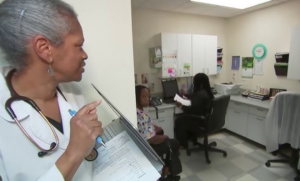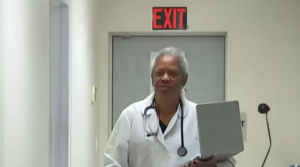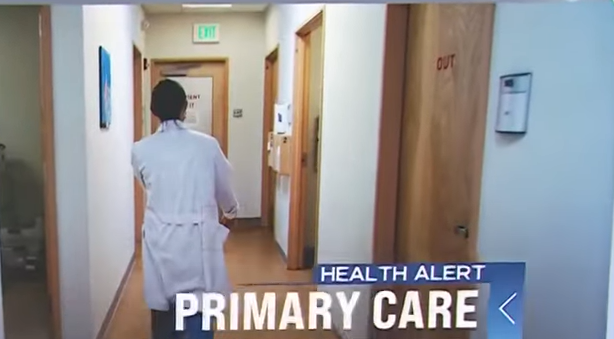Photos: YouTube Screenshots
Our current health care system is broken. Despite spending almost twice as much per capita as any other country, an unsustainable $13,000 per year, 85 million Americans are either uninsured or underinsured; over 60,000 die each year because they can’t get to a doctor when they need to; we pay, by far, the highest prices in the world for prescription drugs; and our life expectancy, already far lower than other developed countries, is getting lower.

As broken as our overall health care system is, the situation with regard to primary health care is even worse. All across this country millions of Americans do not have access to affordable, decent-quality primary care, dental care, mental health counseling, or low-cost prescription drugs. Even people with decent insurance often have to wait months for a medical appointment. In the richest country on earth, that is unacceptable.
Furthermore, despite the enormous amount of money we spend on health care, we have a massive shortage of doctors, nurses, dentists, and mental health providers — shortages which are getting worse every year.
That is why as Chairman of the Senate Health, Education, Labor and Pensions Committee (HELP), I fought to pass the Bipartisan Primary Care and Health Workforce Act. I partnered with Senator Roger Marshall (R-KS) on this legislation to improve the woefully inadequate primary care system in this country and expand the health care workforce. The bill passed the HELP Committee by a vote of 14-7 with strong bipartisan support, which is a major step forward. Now, it’s up to the full Senate to take up this important bill.
Let me be very clear: this legislation is more modest than I would have liked it to be. But if it is passed into law, it would go a long way toward making primary health care in America more affordable and more accessible. It would provide a medical home for millions of Americans who do not have one today by significantly increasing the number of doctors and nurses that we desperately need. It would save us substantial sums of money on our country’s health care costs by focusing on disease prevention and giving patients a medical home rather than costly episodic emergency room care. And it would substantially increase funding for community health care centers, ensuring millions of Americans can access primary care, dental care, and mental health care.
So today I am asking you to join me in calling on the Senate to pass this important legislation so that all Americans can get the health care they deserve. Because the only way it will happen is if we send a message, loudly and clearly, that it is past time to transform primary care in this country and build the health care workforce required to make it possible.
Here’s some of what this legislation would do:
-
- Increase mandatory funding for Federally Qualified Community Health Centers from $4 billion a year to $5.8 billion a year for three years. This will enable more Americans to receive not only high quality primary care, but also dental care, mental health care, and low-cost prescription drugs.
-
- Greatly increases the number of dental operatories at community health centers so that more Americans can get the dental care they need. The new funding will also be used to provide space for additional mental health counselors — among other things.
-
- Triples funding for the National Health Service Corps from $310 million to $950 million per year over the next three years to provide 2,100 scholarships and debt forgiveness for some 20,000 doctors, nurses, dentists, mental health providers, and other health care professionals who commit to working in our nation’s most underserved areas.
-
- More than doubles funding for Teaching Health Centers — going from $126 million a year to $300 million a year for the next 5 years. These centers are extraordinarily important because they allow medical school graduates to do their residencies in community health centers and small rural hospitals instead of just large teaching hospitals in urban areas. If we want more doctors, dentists, and nurses to practice in rural areas and underserved areas, this is an important way to do it.
-
- Increases the number of nurses in America by addressing the shortage of nurse educators. In 2021, U.S. nursing schools turned away over 91,000 qualified applications because of a lack of qualified faculty and inadequate physical infrastructure.
-
- In order to improve disease prevention, health centers will be newly required to provide nutrition services.
-
- Every major medical organization understands that our investment in primary care is woefully inadequate. They understand that focusing on disease prevention and providing more Americans with a medical home instead of relying on expensive emergency rooms for primary care will not only save lives and human suffering — it will save substantial sums of money.
- According to the Director of the Center for Health Policy Research at George Washington University, the funding that we have included in this bill for community health centers alone will save the federal government over $40 billion over the next three years.

Would this legislation solve all of the crises of our health care system? Absolutely not. But it would vastly improve primary care and ensure there are enough doctors, nurses, and health care professionals to provide quality care for all.
I will be working with all of my colleagues in the HELP Committee to advance this legislation through the Senate and get it signed into law as soon as possible. But I can’t do this alone. That is why at this moment it is crucial that we show our movement is united on this issue.
Thank you for adding your name to my petition today to show that we will never stop fighting to guarantee health care as a right for all.








